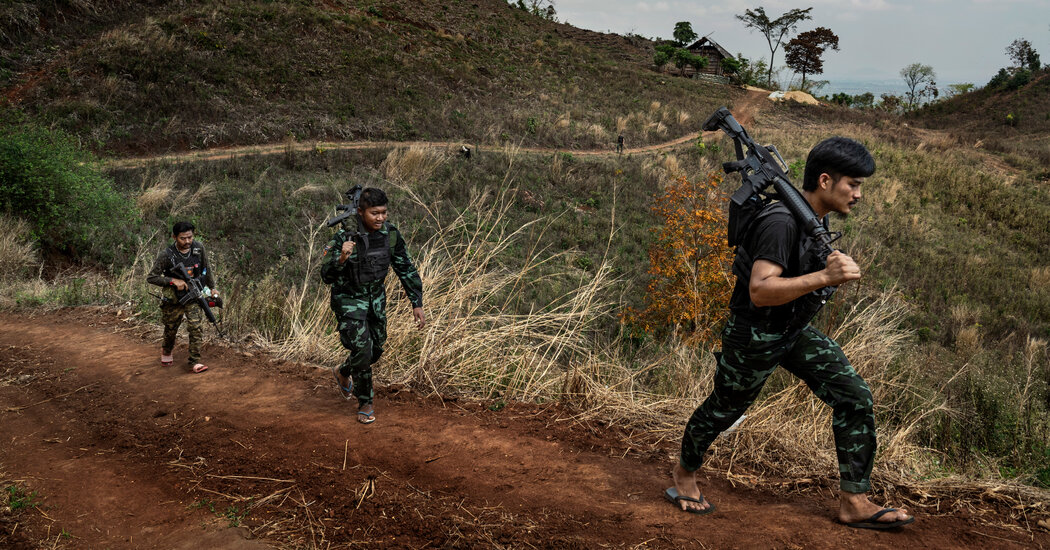
On jungle crests about a mile from the front lines in eastern Myanmar, a former hotel banquet coordinator slipped his index finger onto the trigger of an assault rifle. A dentist recalled picking larvae from a young fighter’s infected bullet wound. A marketing manager described the adapted commercial drones she is directing to foil the enemy.
More than a year after Myanmar’s military seized full control in a coup — imprisoning the nation’s elected leaders, killing more than 1,700 civilians and arresting at least 13,000 more — the country is at war, with some unlikely combatants in the fray.
On one side is a military junta that, apart from a brief interlude of semi-democratic governance, has ruled with brutal force for half a century. On the other are tens of thousands of young city-dwellers who have taken up arms, trading college courses, video games and sparkly nail polish for life and death in the jungle.
New York Times journalists recently visited a rainforest encampment in eastern Myanmar, where about 3,000 members of one newly minted militia are subsisting in crude bamboo or tarpaulin shelters and are engaging in battle nearly every day.
While their numbers are a fraction of one of Southeast Asia’s largest standing armies, these Generation Z warriors have thrown off balance a military that has long made war crimes its calling card. And the conflict is escalating, even as the world’s attention has moved on to other moral outrages, like Russia’s invasion of Ukraine.
Today, far from consolidating its hold over the country, Myanmar’s army, known as the Tatmadaw, is forced to fight on dozens of fronts, from the borderlands near India, China and Thailand to the villages and towns of the country’s heartland. There are skirmishes nearly every day, and casualties, too.
“I am fighting because I don’t accept the military coup, and I don’t accept that they want to take democracy from us,” said a midwife from a city in southern Myanmar, who, like others, did not want her name used to protect her family members back home.
Known by the nom de guerre Snow White, she made her way last May to an area controlled by an ethnic armed group that has been fighting for autonomy for decades. Since then, the ethnic rebels and deserters from the army have taught her how to load a rifle, assemble a handmade grenade and perform battlefield triage.
“Our generation has ideals,” she said. “We believe in freedom.”
Her 3-year-old son remains in the city. He does not know where his mother has gone, she said. Snow White stroked a puppy that made its way through the camp and on to several fighters’ laps.
“It’s something to love,” she said.
Facing attacks from the civilian militias, which are fighting alongside ethnic insurgent groups, the Tatmadaw has ratcheted up a counteroffensive, launching airstrikes, burning villages and terrorizing those opposed to its power grab.
“All the Tatmadaw knows how to do is to kill,” said Ko Thant, who said he was a captain before he deserted from the army’s 77th Light Infantry Division last year and has since trained hundreds of civilians in battlefield tactics. “We were brainwashed all the time, but some of us have woken up.”
The opposition to the military’s coup in February 2021 began with an outpouring of millions of people into the streets of Myanmar’s cities and towns. In sandals, high heels and in the case of Buddhist monks, barefoot, a country rallied peacefully for a return of its elected leadership. Within weeks, the Tatmadaw reverted to its old playbook. Army snipers targeted protesters with single, deadly shots to the head.
Some young people who had come of age during Myanmar’s decade of reform saw little utility in the message of nonviolent dissent coming from veteran democracy activists. They wanted to fight back.
“Peaceful protests don’t work if the enemy wants to kill us,” said Naw Htee, a social worker turned militia sergeant. “We have to defend ourselves.”
With tiny barrettes in her hair, she gestured at mortar fragments and artillery shells, the detritus of war that had rained on the jungle camp where she was living. A young man sat slumped next to her, a ragged scar on his shoulder from a firefight last month.
There are now hundreds of civilian militias across Myanmar, organized loosely into what are called the People’s Defense Forces, or P.D.F. Each militia pledges allegiance to a civilian shadow government, the National Unity Government, which formed after the putsch, and some battalions are led by ousted lawmakers.
The National Unity Government says it has raised more than $30 million for the war effort, mostly from donations from civilians. The surge of money has created curious imbalances. While veteran members of ethnic armed groups fight with old rifles bound in duct tape, some who belong to the People’s Defense Forces show off new weaponry with expensive sights, though all still suffer from arms shortages.
For city kids with soft hands, enduring a malaria-plagued, snake-infested jungle is itself an achievement, much less avoiding the Tatmadaw’s snipers, mortar shells and airstrikes.
“The P.D.F. in the jungle, they have sacrificed their lives for the country, and I have special respect for them,” said U Yee Mon, a former poet who is now serving as the minister of defense for the National Unity Government.
Some of the young combatants were escaping arrest warrants issued for their participation in post-coup protests. They had little choice but to flee.
In a human rights report released on March 15, the United Nations accused the military junta of unleashing mass war crimes on its own people in the aftermath of the putsch.
But aside from some financial sanctions and words of condemnation, the global community has done little to punish Myanmar’s junta. The National Unity Government has not won recognition from any country, even if its ranks are filled with elected politicians. With little hope of outside help, the shadow authority has partnered with the ethnic insurgent groups that control territory in Myanmar’s border regions. Together, they have formed an underground railroad to bring young people to safety — and to train them in basic warfare.
One morning this month, a squad of resistance fighters, none older than 26, marched down to trenches on the front lines of eastern Myanmar, steering clear of handmade land mines they had planted to defend their territory because the army’s positions were so close. Their breaths ran jagged. One fighter tripped on a branch and snapped a flip-flop. A couple of militia members wore body-armor vests, but without the hard ballistic plates that might save their lives.
“I don’t like looking at blood,” said Ko Kyaw, a 19-year-old university student, holding a bullet in his hand. “It makes me feel dizzy.”
A few hours later, a pair of Tatmadaw attack helicopters strafed the rebel trenches, although advance intelligence had cleared the foxholes. At night, like nearly every night, Tatmadaw snipers took aim at whatever caught their attention: the glow from a cellphone whose user was checking Facebook, perhaps, or the red ember of a cannabis joint.
The same day, to the north, a teacher and a medical student who had joined the resistance were killed, one shot in the head by a military sniper, the other felled by a mortar shell.
The National Unity Government claims that the People’s Defense Forces, fighting alongside more experienced fighters from the ethnic militias, killed about 9,000 Tatmadaw soldiers from June 2021 through February 2022. (About 300 militia members have died in combat, according to the shadow government.) A Myanmar military spokesman said the actual death toll was lower, and the shadow authority’s numbers could not be confirmed. But military sources acknowledged that the Tatmadaw was concerned about a rise in casualties.
The resistance’s wounded are treated in an outdoor jungle clinic with bamboo operating tables and a dispensary fashioned out of strips of bamboo. Ko Mon Gyi, a militia member, rested on a wooden platform, his leg bandaged from a gunshot wound sustained in fighting last month. Eight other fighters had been injured that day.
Understanding the Coup in Myanmar
“As soon as I’m healthy, I’ll fight again,” he said. “It’s my duty.”
Presiding over the clinic is a doctor who served in the Tatmadaw for nearly a dozen years. As a battlefield physician, Dr. Drid, as he calls himself, treated Tatmadaw soldiers injured in fighting against some of the same ethnic rebels who are now sheltering his People’s Defense Forces battalion.
“I believe in human rights and democracy,” Dr. Drid said. “The Tatmadaw should fight for these things, protect these things.”
The former army doctor’s voice shook and his hands trembled as he described the day last year when he left home and deserted. He did not tell his family where he went for fear that the Tatmadaw would retaliate against them; some relatives of soldiers who deserted have been imprisoned and tortured. For all his child knows, he said, he might have been killed in combat.
“They are cowards,” he said, of the armed forces he had joined at the age of 15. “They are robots who cannot think.”
For members of Myanmar’s young generation, the coup was a return to an almost unimaginable past, one without Facebook and foreign investment. Under a former army regime, Myanmar had been one of the most isolated countries on earth. Since the putsch, the new junta, led by Senior Gen. Min Aung Hlaing, has banned social media, destroyed the economy and again bunkered an entire nation.
“The generals stole our future,” said Ko Arkar, who until the coup worked as a chef at a hotel in Yangon, the largest city in Myanmar.
He used to spend his days clarifying beef consommé and grilling the perfect medium-rare steak. Now he patrols the front lines with a network engineer, a garment factory worker and a medalist in sailing at the Southeast Asian Games.
Other generations of young people in Myanmar have tried to unseat the military from the jungle. It happened in 1962, after the army’s first coup, and it happened in 1988, after the Tatmadaw crushed mass protests in Myanmar’s version of the Tiananmen Square massacre. Nearly 35 years ago, students and intellectuals fled to the very same forests where the People’s Defense Forces are now sheltering.
They, too, aligned with the ethnic rebels who have been battling for self-rule for decades. After a few years, that student-led armed movement fizzled. The ethnic groups that gave them refuge discovered that the students and their compatriots were not as dedicated to notions of ethnic equality as they had hoped. The military remained in power.
This time, the resistance is better organized and better funded. It has harnessed the energies of young people across the country, who are fighting in both urban and rural environments. And it is partnering more amicably with ethnic armed groups, such as those that represent the Karen minority, which has been fighting one of the world’s longest running civil conflicts.
“We know how evil the Tatmadaw is because they have been killing our people and raping our women,” said Saw Bu Paw, a battalion commander for the Karen National Liberation Army, one of dozens of ethnic rebel groups. “With the coup, everyone in the whole country knows their evil nature.”
United Nations investigators have said that the Myanmar military’s treatment of some of the country’s ethnic minorities bears the hallmarks of genocide. This month, the United States designated the Tatmadaw’s campaign against the Rohingya Muslim minority as a genocide, as well.
While no solid data exists, the number of Tatmadaw desertions appears, anecdotally, to be rising. Even before the coup, soldiers were overstretched and underpaid.
“Who wants to be a soldier now?” asked Dr. Wai, another Tatmadaw doctor who deserted and is now attending to the People’s Defense Forces in the forest. “It is a shameful career.”
War is ugly, and the rebels have been accused of abuses. In the cities, members of People’s Defense Forces have carried out a campaign of assassinations and bombings that have raised questions of whether personal grudges are sometimes being carried out under the guise of fighting for democracy.
Still, the resistance keeps growing, luring unlikely recruits.
Until last year, John Henry Newman, as he is known by his baptismal name, was studying to become a priest at a Roman Catholic seminary in Yangon. His fingers, once practiced at caressing rosary beads, have pressed a rifle trigger again and again. In fighting last December in eastern Myanmar, the enemy was so close, he said — he fired, but he does not know if his bullets made contact.
“Killing is a sin,” he said. “But not when it is a good war.”




